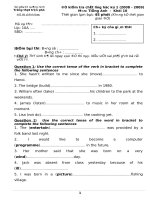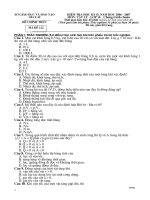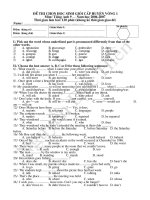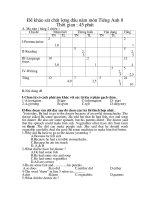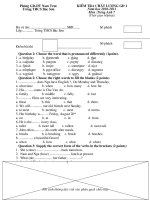- Trang chủ >>
- Khoa học tự nhiên >>
- Vật lý
De dap an HKII Anh 7
Bạn đang xem bản rút gọn của tài liệu. Xem và tải ngay bản đầy đủ của tài liệu tại đây (84.82 KB, 3 trang )
<span class='text_page_counter'>(1)</span>UBND HUYỆN ... PHÒNG GD&ĐT ... ĐỀ KIỂM TRA HỌC KỲ II MÔN: TIẾNG ANH LỚP 7 Năm học 2015 - 2016 Thời gian: 45 phút (Không kể thời gian giao đề) Họ và tên học sinh:.......................................................................... Lớp: 7......... I. Choose the word that has the underlined part pronounced differently from the others. 1. A. cap B. paddy C. woman D. crab 2. A. famous B. nervous C. loud D. serious 3. A. flu B. drugstore C. runny D. up 4. A. helped B. talked C. rented D. stopped II. Choose the best answer. 1. Phuong doesn’t like football and …… Mai . A. so is B. so does C. does so D. neither does 2. These papayas aren’t ripe and ….. are the pineapples . A. so B. too C. neither D. either 3.The dirt from vegetables can make you …….. . A. bored B. tired C. sick D. well 4. You must do your homework more ……. in the future . A. careful B. care C. careless D. carefully 5. You should ……. early if you want to do morning exercise. A. get up B. getting up C. to get up D. to getting up 6. Hoa is a ….. worker. A. hardly B. hard C. more hard D. most hard 7. Last night we didn’t watch the film on TV because it was …….. A. bore B. bored C. boring D. boredom 8 . Mai enjoys ….. sea food with her parents . A. to eat B. eating C. eat D. to eating III. Read the passage carefully then answer questions. In 1960s, most people in Vietnam did not have a TV set. In the evening, the neighbors gathered around the TV. They watched until the TV programs finished. The children might play with their friends and the older people might talk together. Vietnam is different now. Many families have a TV set at home and the neighbors don’t spend much time together. 1. Did most people have a TV set in 1960s? ………………................................………………………………………………………………. 2. How long did they watch TV programs? ………………................................……………………………………………………………….
<span class='text_page_counter'>(2)</span> 3. What might the children do? ………………................................………………………………………………………………. 4. What might the older people do? ………………................................………………………………………………………………. IV. Supply the correct forms of the verbs in brackets. 1. He (wash)………………………….the dishes everyday. 2. We (visit)………………………….Ha Long Bay next summer. 3. She (not watch) ………………………….TV last night. 4. ……… they (go) ………………………….to school now? V. Complete the second sentence sothat it has a similar meaning to the first one. 1. Let’s go to the movies. What about …………….………………………………………………………………? 2. I like watching TV better than playing video games. I prefer…………………………………………………………………………………… 3. Mrs Mai is a good English teacher. Mrs Mai teaches………………………………………………………………………… 4. I spend two hours doing my washing every day. It takes……………………………………………………………………………….
<span class='text_page_counter'>(3)</span> UBND HUYỆN .... PHÒNG GD&ĐT ... ĐÁP ÁN KIỂM TRA HỌC KỲ II MÔN: TIẾNG ANH LỚP 7 Năm học 2015 - 2016 I. Choose the word that has the underlined part pronounced differently from the others: 2,0 điểm (Mỗi ý đúng 0,5 đ) 1. C 2. C 3. A 4. C II. Choose the best answer: 2 điểm (Mỗi ý đúng 0,25 đ) 1. D 5. A 2. C 6 .B 3. C 7. C 4. D 8. B III. Read the passage carefully then answer questions: 2 điểm (Mỗi ý đúng 0,5 đ). 1. No, they didn’t 2. They watched until the TV programs finished. 3. The children might play with their friends 4. The older people might talk together IV. Supply the correct forms of the verbs in bracket: 2 điểm (Mỗi ý đúng 0,5 đ). 1. Washes 2. Are going to visit 3. Didn’t watch 4. Are…going..? V. Complete the second sentence sothat it has a similar meaning to the first one: 2 điểm (Mỗi ý 0,5 điểm) 1 . What about going to the movies? 2. I prefer watching TV to playing video games. 3. Mrs Mai teaches English well 4. It takes me two hours to do my washing everyday./..
<span class='text_page_counter'>(4)</span>
